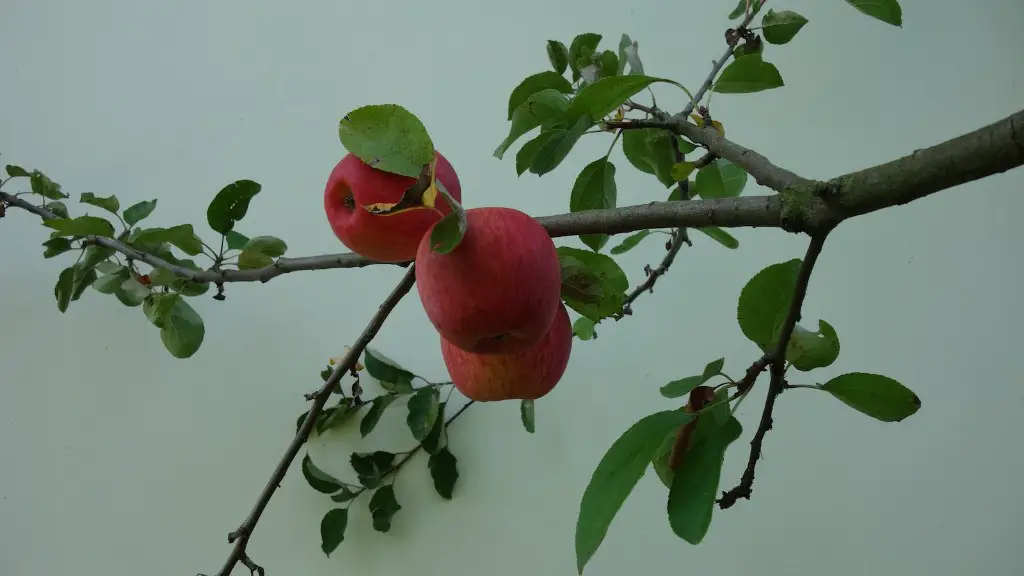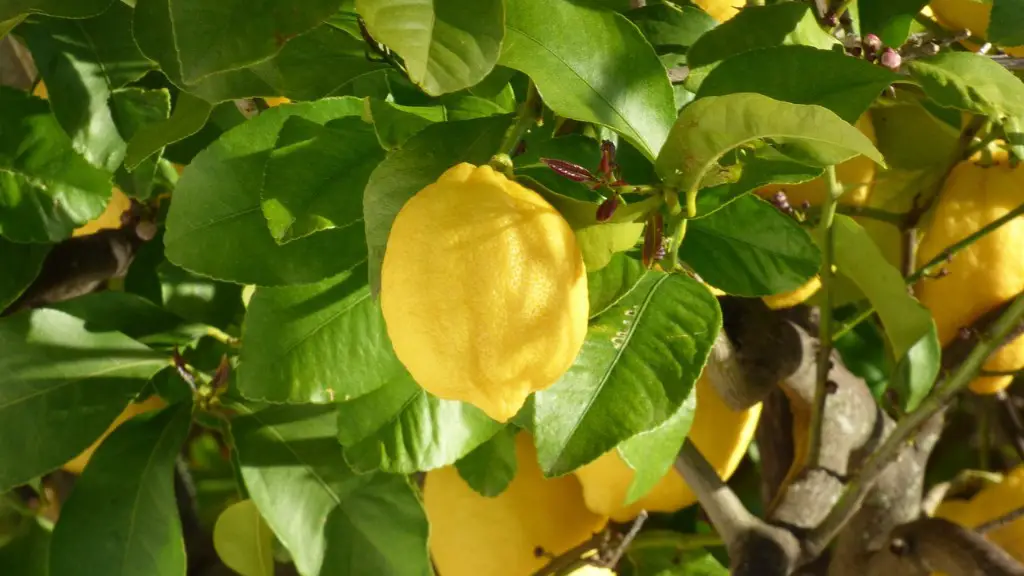Nutritional Qualities of Avocados
Avocados are highly nutritious, as they contain essential vitamins, minerals and other essential nutrients. Avocado also contains monounsaturated fatty acids, which have been associated with an improved cholesterol profile and potential cardiovascular health benefits. Furthermore, they contain a range of carotenoids such as lutein, zeaxanthin and beta-carotene, which are important for eye health. Avocados also contain a high amount of potassium, which is important for muscle and nerve health.
Climate Requirements for Growing an Avocado Tree
Avocado trees can be cultivated in a range of different climates, as they have good tolerance to extremes in temperature. They are often grown in low to moderate temperatures, with temperatures ranging from 25- 95 degrees Fahrenheit. Avocado trees require a lot of sun, as it helps stimulate their growth and productivity. In addition, avocado trees need well-drained soil, that is not overly wet.
How Much Space Does an Avocado Tree Need?
The amount of space needed for an avocado tree to grow depends on the type of tree being planted. Most commercial varieties of avocado trees will require at least 10 by 10 feet of space. Avocado trees that are grown for consumption purposes, such as the Hass, Bacon, and Fuerte varieties, will need approximately 18 feet in diameter of space in order to be productive. Additionally, the roots of avocado trees can extend 3-4 times that diameter, so it is important to make sure that the space is adequate for a full grown avocado tree.
Care & Maintenance Requirements
Avocado trees need regular care and maintenance in order to remain productive. Watering avocado trees is perhaps the most important aspect of care, as they need to be watered once a week during the summer and once every two weeks in the winter. This can be adjusted depending on the climate and rainfall in the area. Additionally, the soil needs to be kept free of weeds, as this can negatively impact the growth and productivity of the tree. Regular pruning and fertilization are also important. Fertilization should be done once a year, in the spring or fall, and pruning should be done in late winter or early spring to ensure that the tree is not overgrowing or becoming too unruly.
Pests & Diseases
Avocado trees are prone to a variety of pests and diseases. Common pests include Scale insects, Thrips, Aphids, Leafhoppers, and Mites, which can all cause significant damage to the tree. Similarly, common diseases that can affect avocado trees include root rot, Phytophthora root rot, bacterial spot and anthracnose. Preventative measures should be taken in order to mitigate the impact of pests and diseases, such as reducing the number of waterings and increasing the sunlight exposure the tree receives.
Harvesting & Ripening
Avocado trees can take anywhere from 3-4 years to become productive, and harvesting usually begins in late summer or fall. Fully mature avocados can be picked from the tree, however in order for them to be ripe, they need to be left on the tree for a few extra days. In order to tell if an avocado is ripe, it should be slightly firm to the touch and have a slight give when a gentle pressure is applied to the skin.
Nutritional Benefits of Avocados
Eating avocados is a great way to incorporate some of the essential vitamins and minerals into the diet. Avocado is filled with vitamins A, B, C, K and E, as well as folate, niacin, and pantothenic acid. Furthermore, avocado contains potassium, magnesium, and zinc, all of which are essential for healthy bodily function. The dense nutritional profile of avocado means that it can provide numerous health benefits, such as lowered cholesterol and healthier skin.
Eating Avocados
Avocados are incredibly versatile when it comes to cooking. They can be added to a variety of dishes, from salads to baked goods, as a source of healthy fats and flavor. Avocados are often eaten raw, either on their own or accompaniments such as rice or vegetables. They can also be used in smoothies, dips, spreads, and sandwiches. Additionally, avocados can be pulverized and formed into a paste, which can be used to make guacamole.
Environmental Impact
Avocado trees can have a significant environmental impact when not cared for properly. Avocado trees require large amounts of water and fertilizer, which can lead to soil and water pollution in their vicinity. They also contribute to air pollution, as the production of avocados often involves the use of chemical fertilizers, pesticides and fungicides, which release toxins into the atmosphere. Therefore, it is important to take a sustainable and responsible approach to cultivating avocados, in order to minimize any potential environmental harm.
Health Benefits of Avocado-based Products
Avocado-based products such as oils, spreads and butters are becoming increasingly popular due to their nutritional benefits. The high-fat content of avocados makes them a great source of energy, as the fats provide a steady and sustained release of energy. Additionally, these products are rich in monounsaturated fatty acids, which have beenassociated with an improved cholesterol profile and potential cardiovascular health benefits. Avocado-based products can also be used in place of butter or oils in baking, as they have a lower saturated fat content, which can help reduce the risk of cardiovascular diseases.
Using Avocados As a Skin Care Product
Avocados can also be used as a skin care product, as they are rich in antioxidants, vitamin A, and potassium. These substances can help hydrate the skin, and the fatty acids found in avocados can help the skin stay soft and supple. Furthermore, the anti-inflammatory properties of avocados can help to reduce redness, irritation, and swelling. Avocados can also be mashed and mixed with other ingredients such as honey and olive oil to create a face mask, which can be left on for 20 minutes for a more intensive skin care treatment.
Growing and Producing Avocados Organically
More and more people are becoming aware of the potential adverse effects of the use of chemical fertilizers and pesticides in food production. Therefore, many are opting for organic food production methods, in order to minimize the environmental and health impacts. Avocado trees can actually be grown organically, as long as the soil is well fertilized and weeds are controlled. Additionally, beneficial insects such as ladybugs and lacewings, which prey on common avocado pests, can be released onto the avocado tree, in order to minimize the use of chemical pesticides.
Harvesting and Marketing Avocado Products
Harvesting avocados correctly is important in order to ensure that consumers receive the best quality products. Once avocado trees become productive, it is essential to keep a close eye on ripening, as avocados that are left on the tree for too long can rot and become inedible. Additionally, it is important to make sure that the harvest process is done correctly, as avocados that are picked too early or dropped onto the ground can be damaged. Furthermore, the marketing of avocado products is also important, as it is important to have the right message in order to attract customers.
Preparing Avocados for Cooking
Avocados can be prepared in a variety of ways, in order to enhance the flavor and texture of dishes. Cutting an avocado in half and then removing the stone and skin can be done in order to access the flesh, which can then be cut into cubes and added to salads, burgers, and other dishes. Avocados can also be mashed and mixed with other ingredients such as yogurt, garlic and lemon juice to create guacamole. Moreover, avocado can be diced, pureed and added to smoothies, enhancing the nutritional value of the drink.
Storage and Preservation
Once avocados have been harvested, it is important to store them correctly in order to maximize their shelf life. Unripe avocados should be stored at room temperature, as exposing them to cold temperatures can reduce their ripening potential. Ripe avocados should be stored in the fridge, and can be preserved further by mixing them with lemon or lime juice, or even wrapping them in plastic wrap. Moreover, ripe avocados can also be frozen, and when thawed, they will still retain their texture and flavor.


